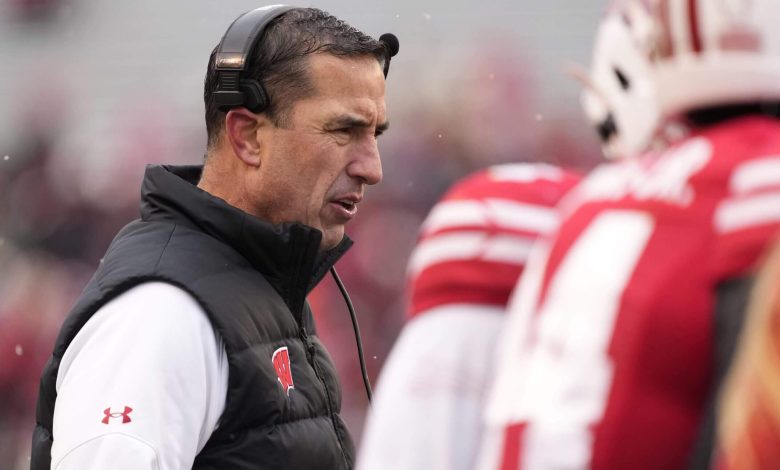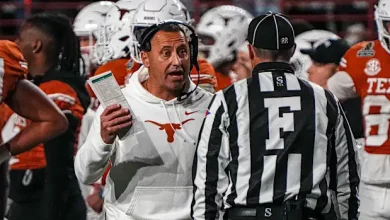Luke Fickell increased the number of assistant coaches on the Wisconsin football staff for three reasons.

Luke Fickell Increases the Number of Assistant Coaches on the Wisconsin Football Staff: A Strategic Move for the Badgers
Since taking the helm as head coach of the Wisconsin Badgers in 2022, Luke Fickell has made a series of calculated decisions that demonstrate his commitment to improving the football program. Among these decisions, one of the most notable changes has been the increase in the number of assistant coaches on the staff. By expanding the coaching staff, Fickell is addressing several key issues in the program and positioning Wisconsin football for continued success in the ultra-competitive Big Ten Conference.
In this article, we will explore the reasons why Fickell has made this move, examining three core factors that led to his decision to add more assistant coaches: improving recruitment and player development, enhancing game preparation and in-game adjustments, and keeping up with the growing complexity of modern college football. Each of these reasons is interwoven with Fickell’s broader vision for the future of the Badgers and his commitment to restoring Wisconsin’s status as a perennial powerhouse in college football.
1. Improving Recruitment and Player Development
Recruitment is the lifeblood of any college football program, and the quality of a coaching staff directly impacts a team’s ability to identify, attract, and develop talent. Wisconsin has traditionally excelled in developing players, especially in the trenches, where the Badgers have produced NFL-caliber offensive and defensive linemen. However, with the ever-evolving landscape of college football, particularly with the expansion of the transfer portal and the increasing importance of national recruiting, Fickell recognized that Wisconsin needed to be more aggressive and strategic in its recruitment efforts.
A. The Need for Specialized Coaching
In the past, Wisconsin was known for its powerful running game and solid defense, but as college football has grown more diverse and dynamic, recruiting needs have evolved. Teams are now looking for players who can not only excel in traditional positions but also possess versatility, athleticism, and the ability to perform at a high level across a variety of schemes. This requires highly specialized coaching in areas such as wide receiver development, secondary play, and special teams, which had traditionally received less emphasis at Wisconsin.
With Fickell’s focus on improving Wisconsin’s overall talent pool, the decision to increase the number of assistant coaches allows for a more specialized and individualized coaching approach. By bringing in additional coaches, Fickell has been able to assign experts to focus on specific positional groups. This enables the staff to dedicate more time and energy to refining the skills of individual players, which in turn enhances the overall development of the team. For instance, recruiting and developing elite wide receivers, a position Wisconsin has traditionally struggled to develop, now has a dedicated position coach, allowing that area to receive more focused attention.
B. Enhancing the Player Development Pipeline
In addition to improving recruitment, Fickell’s increase in the number of assistant coaches also ensures that Wisconsin can maintain its reputation for player development. The Badgers have a history of turning overlooked recruits into future NFL stars. For this to continue, Fickell needed to ensure that each position group had the attention and resources required to maximize the potential of every player.
The expanded coaching staff allows the program to work with players on a more individualized basis. With more coaches, the staff can break down film, work on technical skills, and address specific weaknesses for each player. This approach helps ensure that every player is developing at the pace that best suits their skill set and ability.
In particular, position-specific coaching allows for more efficient development of players who might otherwise go unnoticed in more generalized systems. For example, Wisconsin has historically been known for producing strong offensive linemen, and Fickell’s increased focus on adding a deeper staff allows the Badgers to continue their reputation for excellence in the trenches.
Moreover, the ability to break the staff into smaller, more specialized units enables coaches to more effectively communicate and build relationships with players. Personal relationships between players and coaches are integral in fostering a culture of development, which in turn enhances player performance and morale.
C. Tapping into National Talent
One of Fickell’s key strategies in rebuilding Wisconsin into a top-tier program is expanding the team’s recruiting reach. In previous years, Wisconsin had tended to focus its recruiting efforts primarily within its traditional recruiting footprint: the Midwest. However, with the growing influence of the transfer portal and the increased competition for top-tier talent, Fickell is now aiming to cast a wider net to recruit players from across the country.
An expanded staff allows Wisconsin to hire coaches with more diverse and extensive recruiting backgrounds. Fickell has already brought in staff members with connections to recruiting hotbeds outside the Midwest, including the South and the West Coast. Having additional assistant coaches allows Wisconsin to target a broader range of prospects, both high school recruits and transfer portal players, from a larger geographical area.
By enhancing its recruiting staff, Wisconsin can also ensure that it remains competitive with other programs in the Big Ten and across the country. With elite programs consistently raiding top talent from all over the country, having an expanded staff allows Wisconsin to keep pace in the race for elite recruits.
2. Enhancing Game Preparation and In-Game Adjustments
In today’s fast-paced college football environment, success on the field is not just about recruiting talented players; it’s also about out-scheming and out-coaching your opponents. A key element of Fickell’s strategy for Wisconsin football is improving the program’s ability to prepare for games and make adjustments during the course of a game. By expanding the coaching staff, Fickell is positioning Wisconsin to be more competitive in these critical areas.
A. More Focus on Game Plan Preparation
Football is a complex game that requires extensive planning and preparation. In the past, Wisconsin’s coaching staff was able to design solid game plans, but with a larger staff, they can now afford to be more detailed and focused. Having more coaches means that the team can break down film more efficiently, identify the strengths and weaknesses of their opponents, and develop game plans that target those areas.
In particular, this expanded coaching staff allows for a more thorough analysis of individual position groups. For example, a wider receiver coach can focus on studying an opponent’s secondary, while a defensive backs coach can delve into specific tendencies of the opposing quarterback. With more coaches in place, Wisconsin’s coaching staff can develop more sophisticated game plans that anticipate and counteract an opponent’s strategies.
B. Increased Focus on In-Game Adjustments
In-game adjustments are a key aspect of coaching. Teams must be able to recognize what is working and what isn’t during the course of a game, then make changes on the fly. With more assistant coaches on staff, Wisconsin can improve its ability to make adjustments quickly and efficiently.
For example, if the Badgers find that their running game is being stymied by an opponent’s defensive line, the coaching staff can immediately communicate the need for schematic adjustments, such as pulling off a specific blocking scheme or running different types of plays. With an increased number of coaches, there are more eyes on the game, allowing for faster decision-making and more effective adjustments.
Moreover, having additional coaches allows for a more personalized approach to adjustments. For instance, individual position coaches can work directly with players to modify their technique or strategy based on the in-game situation, helping to correct mistakes or adapt to the opposing team’s tactics.
C. Preparing for Future Success
Improving the game preparation process with a larger coaching staff will have long-term benefits for Wisconsin as well. Fickell is aiming to build a program that is prepared for any situation, whether it’s a crucial conference game, a high-profile non-conference matchup, or a potential bowl game.
The ability to adjust mid-game and develop detailed game plans will allow Wisconsin to compete with the best programs in the nation, ensuring that the Badgers are consistently ready to take on any challenge.
3. Keeping Up with the Growing Complexity of Modern College Football
The landscape of college football has changed dramatically in recent years. With the introduction of the transfer portal, name, image, and likeness (NIL) deals, and an increasingly complex recruiting environment, programs must adapt to stay competitive. Fickell is keenly aware of these changes, and by increasing the number of assistant coaches, he is preparing Wisconsin for the modern era of college football.
A. Navigating the Transfer Portal
The transfer portal has revolutionized college football recruiting, providing programs with the opportunity to bolster their roster mid-season or between years. However, navigating the transfer portal requires a significant amount of resources and personnel. Each transfer is unique, and recruiting players out of the portal requires a deep understanding of their strengths, weaknesses, and fit within the program.
By increasing the number of assistant coaches, Fickell is ensuring that Wisconsin has the bandwidth to effectively scout, evaluate, and recruit transfer portal players. A larger coaching staff enables the Badgers to identify players who can make an immediate impact, whether it’s for a starting role or depth purposes.
B. Adapting to Changing Strategies and Schemes
College football offenses have become more dynamic and creative over the years, with a growing emphasis on passing schemes and up-tempo offenses. Defending against these schemes requires a more nuanced approach and greater specialization in defensive coaching. By increasing the number of assistant coaches, Fickell has ensured that Wisconsin can respond to these challenges by bringing in specialists who are experienced in defending modern offenses.
Similarly, on the offensive side of the ball, the Badgers have shifted toward more balanced offensive schemes, incorporating a more varied passing game alongside their traditional power running attack. More assistant coaches allow for greater focus on adapting and executing these modern offensive philosophies.









